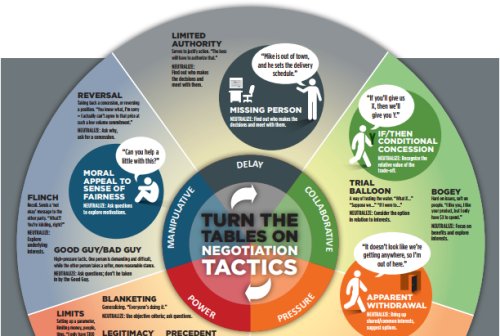Most negotiations are simple and straightforward and happen without any preparation. This is fine if the issues at stake are not important and the situation really is simple. It is not fine when the issues are important or when negotiations are complex. In fact, the more complex the negotiation the more time and attention we need to invest in preparing. There is, however, some basic preparation we can carry out that will apply to any negotiation and these 10 tips will give you a useful start point.
1. Carry out any necessary research. For example, if you are negotiating to buy something make sure you know competitors prices and other key terms and conditions before you beginning the negotiation.
2. Identify and list everything that is potentially open to negotiation in this discussion. Try to look beyond the obvious.
3. Prioritise your list in terms of importance to you. Which items are easier for you to compromise and which are you unwilling or unable to move on?
4. Set your negotiating range. What is your opening position going to be? What are you aiming to achieve? What is the least (or most) you are prepared to accept? By setting your range beforehand you are more likely to achieve an acceptable result.
5. Consider what outcome the other negotiator might be looking for or might be prepared to accept.
6. Plan how you will move from your opening position and what you will expect in return.
7. What questions do you need to ask the person you are negotiating with? Think about the information you need to gather from them. This is also about asking questions to check what your opponent needs from the negotiation.
8. What questions might they ask you and how are you going to answer these? In particular, be sure to plan for those questions that might be difficult for you to answer.
9. Find out what you can about the other negotiator. What style of negotiation might they adopt? Are they likely to be competitive or will they be more inclined to take a collaborative approach? This will help you to plan how you will work with them during the negotiation.
10. Consider what you will do instead if your negotiation cannot reach a satisfactory conclusion. This will give you the confidence to walk away or take an alternative approach to negotiation if things are not going well.
This short list cannot possibly cover every aspect of preparing for negotiation. There is also a lot to consider for every one of these ten tips. However, you can use this as a basic checklist when you are preparing for any negotiation. By working through every item on this checklist you are much more likely to have a successful negotiation than if you wade into a discussion without any proper thought.
Wolfgang Halliwell is a learning and development consultant who has authored a number of courses for Trainer Bubble.
For affordable training solutions ... in an instant Trainer Bubble
Related: Negotiation Seminars
Free Downloads

Neutralizing Negotiation Tactics
Public Negotiation Training